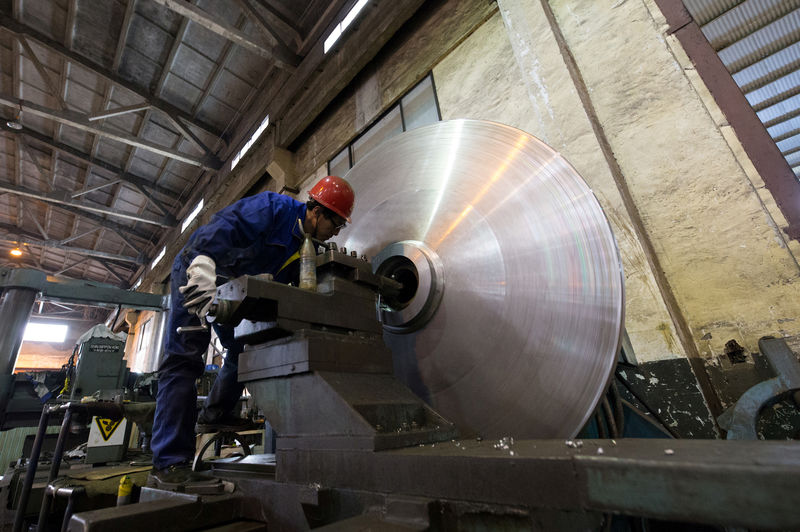BEIJING (Reuters) - Activity in China's vast manufacturing sector likely shrank for the second straight month in January, a Reuters poll showed, heightening concerns over the risks the Chinese slowdown poses to the global economy.
Industrial bellwether Caterpillar (NYSE:CAT) became the latest heavyweight multinational to warn of cooling demand in China this week, joining tech firms such as micro-chip makers and Apple Inc (NASDAQ:AAPL).
China's official manufacturing Purchasing Manager's Index (PMI) is forecast to dip marginally to 49.3 from December's 49.4, according to the median forecast of 33 economists.
The 50-mark separates growth from contraction on a monthly basis. January's reading was the weakest since February 2016.
The data gives global investors their first look at business conditions in China at the start of the year, but this year it might be distorted by the week-long Lunar New Year break that begins on Feb. 4, analysts said.
Businesses typically scale back operations or close for lengthy periods around the holidays.
However, Reuters interviews with workers, business owners, labor activists and trade lawyers revealed some businesses are shutting earlier than usual this year as a prolonged trade war with the United States curtails orders.
Unless Washington and Beijing reach some sort of compromise in current negotiations that will relieve tariff pressures, more factories are likely to shutter their gates for good.
Bleak PMI readings would raise the possibility that Beijing may speed up and intensify its policy easing and stimulus efforts this year, after a series of measures in 2018, analysts said.
Still, many China watchers believe business conditions are likely to get worse in coming months before the impact of support steps starts to be felt. Some economists believe growth could even dip below 6 percent in the first half -- from 6.4 percent in the fourth quarter -- before stabilizing later in the year.
Growth in the world's second-largest economy cooled to 6.6 percent in 2018 - the slowest in 28 years - from 6.8 percent in 2017.
Activity has been curbed by a regulatory crackdown on riskier lending and debt which led to a sharp slowdown in investment, and by escalating tit-for-tat trade tariffs with the United States that have disrupted China's supply chains and soured both business and consumer confidence.
A private survey - the Caixin/Markit Manufacturing Purchasing Managers' index (PMI) - which focuses more on small and medium-sized Chinese firms - is also expected to show a deeper contraction in January, slipping to 49.5 from 49.7 in the previous month, marking the lowest since June 2016.
Policymakers have made repeated attempts to keep cash-starved private companies afloat and reduce the risk of sharper job losses.
But with sales and profits under pressure and some idle capacity already, analysts believe many factory owners are in no mood to make the new investments that Beijing needs to engineer a sustainable turnaround.
Profits at China's industrial firms shrank for a second straight month in December, data showed this week.
STRUGGLING COMPANIES
Since last year, the government has ramped up infrastructure spending, reduced taxes and lowered bank's reserve requirements five times to help spur lending. December data suggested construction may be slowly picking up in response, but property and manufacturing investment are continuing to cool.
Investors are closely watching to see if Beijing unveils more fiscal stimulus during an annual parliamentary meeting in March, including bigger tax cuts.
JP Morgan expects a combination of easing measures to be announced this quarter, including 200-300 basis points of bank reserve cuts (100 bps of reductions came this month), a 2-percentage point cut in the value-added tax (VAT) rate and policies to boost sales of cars and home appliances.
VAT cuts are seen as the most important measure to revive investor confidence, global market strategist Chaoping Zhu said in a note.
Sources have told Reuters that Beijing was planning to lower its growth target to 6-6.5 percent this year from around 6.5 percent in 2018.

The official PMI survey is due out on Jan. 31, along with a sister survey on services. The Caixin manufacturing PMI will come out on Feb. 1 and its services PMI on Feb. 3.